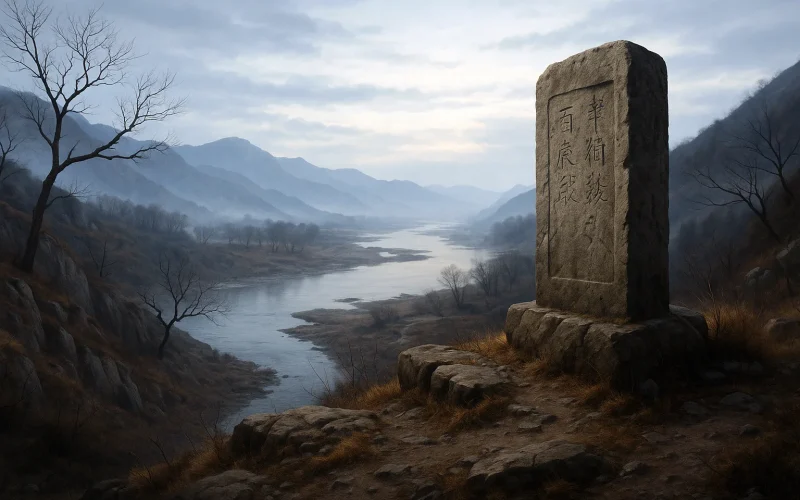While worldly matters take their turn,
Ancient, modern, to and fro,
Rivers and mountains are changeless in their glory
And still to be witnessed from this trail.
Where a fisher-boat dips by a waterfall,
Where the air grows colder, deep in the valley,
The monument of Yang remains;
And we have wept, reading the words.
Original Poem
「与诸子登岘山」
孟浩然
人事有代谢, 往来成古今。
江山留胜迹, 我辈复登临。
水落鱼梁浅, 天寒梦泽深。
羊公碑字在, 读罢泪沾襟。
Interpretation
Written during Du Fu's travels in Xiangyang, this poem transcends conventional landscape poetry by transforming a mountain ascent into a profound meditation on historical legacy and personal unfulfillment. Mount Xian, site of a memorial stele for Jin dynasty general Yang Hu, becomes the stage where Du Fu confronts the chasm between ancestral achievement and contemporary frustration.
First Couplet: "人事有代谢,往来成古今。"
Rénshì yǒu dàixiè, wǎnglái chéng gǔjīn.
Human affairs follow cycles of renewal, Their comings and goings weave history's fabric.
The philosophical opening establishes time's inexorable flow, situating the poet's personal reflections within universal patterns of rise and decline.
Second Couplet: "江山留胜迹,我辈复登临。"
Jiāngshān liú shèngjì, wǒ bèi fù dēnglín.
Rivers and mountains preserve heroic traces, As we of this age climb to witness again.
"Heroic traces" (胜迹) and "witness again" (复登临) frame the ascent as ritual reenactment, connecting present footsteps with past glory through landscape's enduring testimony.
Third Couplet: "水落鱼梁浅,天寒梦泽深。"
Shuǐ luò yúliáng qiǎn, tiān hán mèng zé shēn.
Receding waters expose Fish Weir's shallows; Winter skies deepen Dream Marsh's mystery.
Nature's seasonal transformations mirror historical sedimentation - the exposed shallows suggesting vulnerability, while the "deepened" marsh implies unfathomable temporal depths.
Fourth Couplet: "羊公碑字在,读罢泪沾襟。"
Yáng gōng bēi zì zài, dú bà lèi zhān jīn.
Lord Yang's stele stands with words still clear - Reading them, my tears soak this robe.
The preserved inscription becomes a mirror reflecting the poet's unrecorded aspirations, where the physical act of reading dissolves into emotional communion across centuries.
Holistic Appreciation
The poem orchestrates a symphony of temporal dimensions: cyclical time (couplet 1), historical time (2), seasonal time (3), and eternal time (4). Du Fu's ascent becomes an archaeological dig through layers of meaning - from philosophical abstraction through natural observation to visceral emotional response. The stele's enduring words ultimately serve less as memorial to Yang Hu than as indictment of the poet's own unfulfilled potential, transforming public monument into private confessional.
Writing Characteristics
The language of this poem is simple and unadorned, yet rich in profound meaning. With restrained brushstrokes and a serene, far-reaching artistic conception, Du Fu seamlessly intertwines philosophy, history, and reality. Through his elegiac reflection on the ancient site, he expresses both admiration for past achievements and melancholy over his own circumstances. Structurally, the poem begins with contemplation, transitions into scenic description, and culminates in lyrical expression—each layer distinct yet masterfully interconnected. The closing couplet employs allusion naturally, blending emotion with the landscape to convey genuine feeling without artifice, making it deeply moving.
Insights
This mountain climb reveals how historical memory can both comfort and accuse. Du Fu demonstrates that our deepest encounters with monuments often measure not the past's grandeur, but our present inadequacies. The work suggests true historical consciousness begins when we stop admiring relics and start conversing with them - when Yang Hu's stele becomes less a tribute to his achievements than a question about our own. For modern readers, it offers a model for engaging with tradition not through passive reverence, but through active, even painful self-reckoning.
Poem translator
Kiang Kanghu
About the poet

Meng Haoran (孟浩然), 689 - 740 AD, a native of Xiangyang, Hubei, was a famous poet of the Sheng Tang Dynasty. With the exception of one trip to the north when he was in his forties, when he was seeking fame in Chang'an and Luoyang, he spent most of his life in seclusion in his hometown of Lumenshan or roaming around.












